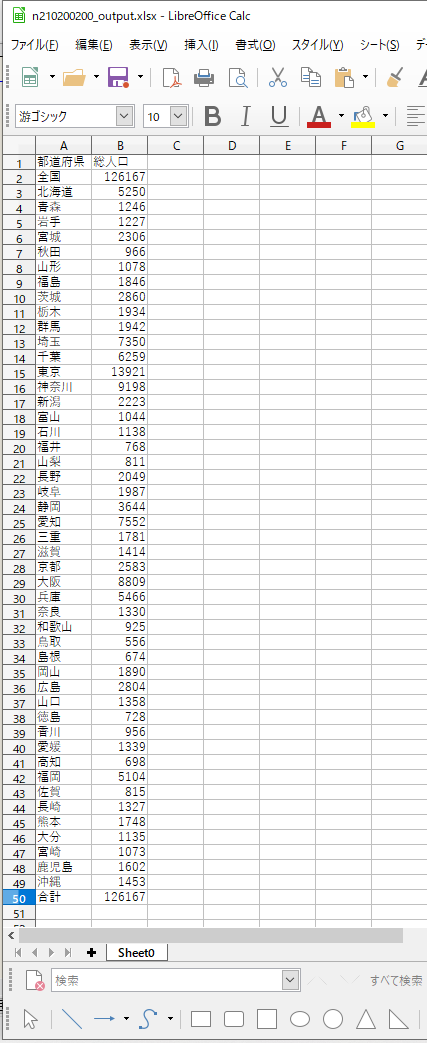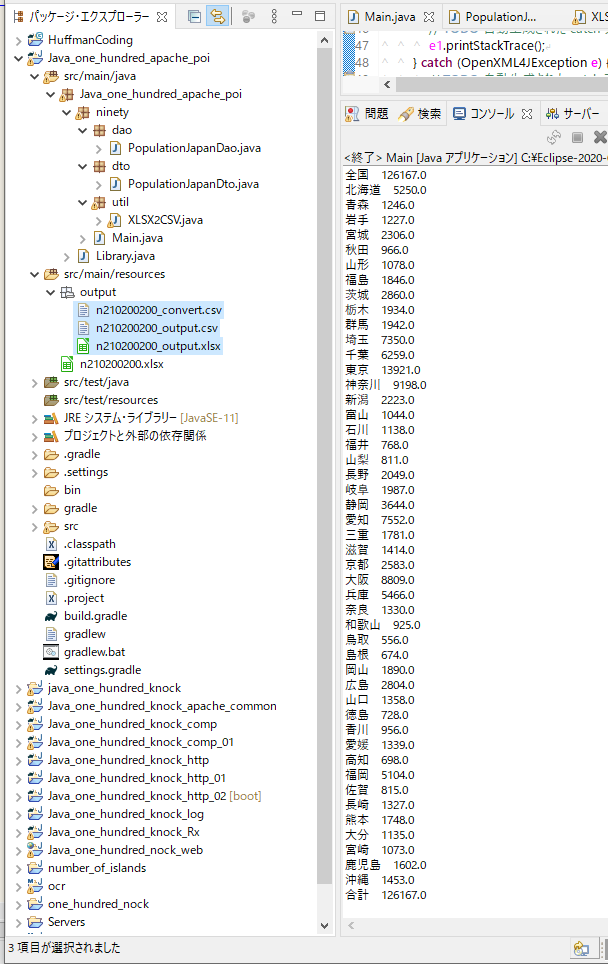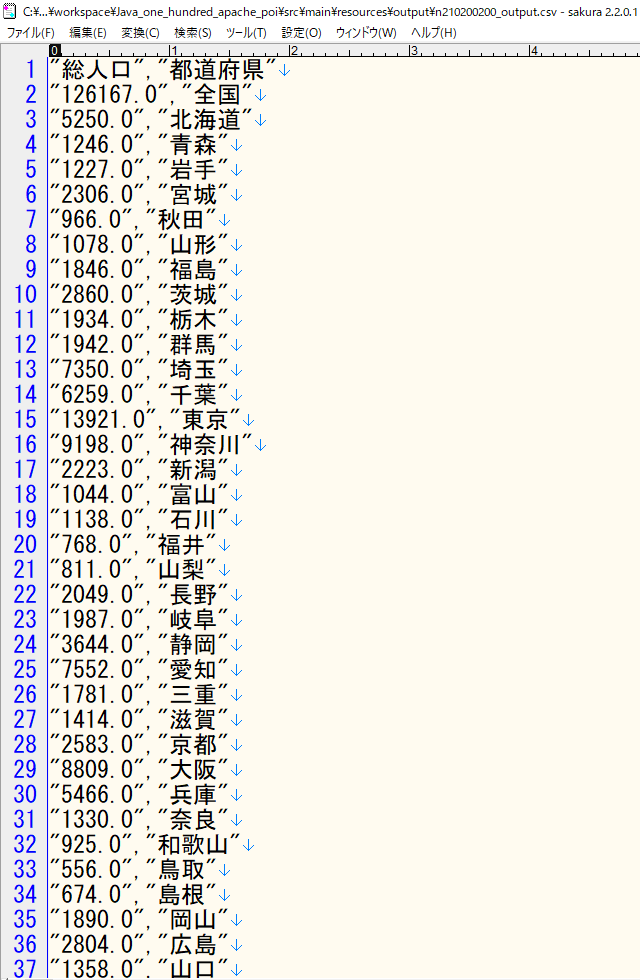
米Microsoftのサティア・ナデラCEOは5月25日(現地時間)、同日から開催のオンライン開発者イベント「Build 2021」の基調講演で、「間もなくこの10年で最も重要なWindowsアップデートの1つについて発表する」と語った。
MicrosoftのナデラCEO、「次世代Windowsを間もなく発表」:Build 2021 - ITmedia NEWS
⇧ う、う~ん...
「Windows アップデート」で、私の環境ではいろいろ不具合が起こってるほうなので何か信用できないんよね...
今回もJavaについてです。
レッツトライ~。
CSV(Comma-Separated Values)って?
Wikipediaさんに聞いてみよう。
comma-separated values(略称:CSV)は、テキストデータをいくつかのフィールド(項目)に分け、区切り文字であるカンマ「,」で区切ったデータ形式。拡張子は .csv、MIMEタイプは text/csv。
「comma-separated variables」とも言う。日本語では広く普及した訳語はないが、「カンマ区切り」「コンマ区切り」などとも呼ばれる。Microsoft Excelの日本語版では「CSV (カンマ区切り)」としている。
⇧ ってことなんだけど、
類似したフォーマットとして、タブで区切られた tab-separated values (TSV) や、欧文間隔 (いわゆる半角スペース) で区切られた space-separated values (SSV) などがあり、これらをまとめて character-separated values (CSV) や delimiter-separated values (DSV) などと呼ぶことも多い。
⇧ はい、出ました。
どっちの「CSV」指してるのか 認識齟齬が発生するやんけ~!
2005年10月、それまでの各ソフトウェアにおけるCSVの実装を追認する形で、RFC 4180 で Informational(IESGの外部で決定された有用な情報の提供)として仕様が成文化された。しかし実際のソフトウェア側の実装はRFCに準拠していないことが多い。
⇧ 仕様は、「RFC 4180」で定義されてるんだそうな。
JavaでCSV(Comma-Separated Values)を扱うライブラリっていうと?
Javaの場合「CSV(Comma-Separated Values)」を扱うライブラリっていっても、おそらく種類がたくさんあるんだとは思うんだけど、何がおススメなんかね?
その前に、「CSVライブラリ」って言った場合の「CSV」って、
のどっちになるんだろうか?
とりあえず、「CSV(Comma-Separated Values)」って体で、話を進めてみますか。
⇧ 上記サイト様で紹介されてるだけでも、どれを選んだら?ってなぐらいライブラリの数が豊富なんで、困っちゃいますね。
ライブラリの更新状況から見るに、「OrangeSignalCSV」「Super CSV」を使うのは微妙そうな感じですかね。
「CsvMapper」ってのも、「Jackson」に依存してるっぽいので、「Jackson」を使ってないようなプロジェクトだと微妙になってきますね。
ということで、選択肢的には、
のどっちかが良いのかな、と思ったんですが、「Opencsv」が使いやすいと仰る方が多そうな感じみたいなので、「Opencsv」を利用してみることにします。
ちなみに、
⇧ 上記サイト様によりますと、巨大なサイズの「Excel」ファイルから「CSV(Comma-Separated Values)」 への変換って用途には、「Apache POI」のAPIで何とかできるらしい。(なんか、空のCSVファイルしかできなかったんだが...インプットに使ってるExcelファイルの説明がないから本当に動くのかが分からん...)
⇧ 上記サイト様も「コンソール」出力っぽいのよね...
ちなみに、
⇧ JDK11の変更で「XMLとJavaをバインディング」してた「JAXB(Java Architecture for XML Binding)」ってAPIが、JDKの標準APIから除外されたらしく、JDK 11以上で「JAXB(Java Architecture for XML Binding)」に依存する機能を使いたい場合は、自分で「JAXB(Java Architecture for XML Binding)」を追加する必要があるらしい...知らんがな。
さらに、「Apache POI」で「org.apache.poi.ooxml.util.SAXHelper」が「Depricated(非推奨)」になったらしい...
まぁ、何て言うか、「Depricated(非推奨)」にするのは構わんけど、ちゃんと代替のコーディング例ってのを紹介してくれても良い気はするよね...
そして、

⇧ 上記の「XLSX2CSV.java」のリンクから、公式のサンプルを確認してみたところ、一応、動くには動いたけど...
「CSV(Comma-Separated Values)」形式で「コンソール」に出力する例というね...
っていうか「コンソール」に出力するって、使い道ないやん...
実際に試してみる
とりあえず、実際に試してみますか。
⇧ 上記では、「OrangeSignal CSV」てライブラリを使えってなってるんですが、流石に「OrangeSignal CSV」のライブラリの「最終更新」が「2014-09-20」ってなってるので、他のライブラリを使っていこうかということで、今回は「Opnecsv」をチョイス。
今回は、「Excel」からデータを読み込んで、「Opencsv」の処理をかまして、最終的に「CSV」ファイルに出力という流れなので、

⇧ みたいな処理の流れになる感じですかね。
今回は「CSV(Comma-Separated Values)」のデータが複数行になってるので、「opencsv」が「読み込んだデータ」から「Bean」にする際に、「Bean」のリストとなるように良しなに処理してくれるらしい。
と思ったら、「CSVファイル」に「空白行」とか「改行」のみの行があると、「Bean」に変換される際にエラー起きて上手くいかないし...
おまけに、
⇧ 何か、「ヘッダー」が上手く認識されないっぽい問題も起こるみたいね...
そして、
⇧ エンコーディングの問題とかも起きがち...
「Apache POI」に続き、「Opencsv」も扱い辛さが半端ない...実業務で使うの躊躇してしまうんだが...
というわけで、必要なファイルは以下のようになりました。

/*
* This file was generated by the Gradle 'init' task.
*
* This generated file contains a sample Java Library project to get you started.
* For more details take a look at the Java Libraries chapter in the Gradle
* User Manual available at https://docs.gradle.org/6.3/userguide/java_library_plugin.html
*/
plugins {
// Apply the java-library plugin to add support for Java Library
id 'java-library'
}
repositories {
// Use jcenter for resolving dependencies.
// You can declare any Maven/Ivy/file repository here.
jcenter()
}
dependencies {
// This dependency is exported to consumers, that is to say found on their compile classpath.
api 'org.apache.commons:commons-math3:3.6.1'
// This dependency is used internally, and not exposed to consumers on their own compile classpath.
implementation 'com.google.guava:guava:28.2-jre'
// https://mvnrepository.com/artifact/org.apache.poi/poi
implementation group: 'org.apache.poi', name: 'poi', version: '4.1.2'
// https://mvnrepository.com/artifact/org.apache.poi/poi-ooxml
implementation group: 'org.apache.poi', name: 'poi-ooxml', version: '4.1.2'
// https://mvnrepository.com/artifact/org.apache.poi/poi-ooxml-schemas
implementation group: 'org.apache.poi', name: 'poi-ooxml-schemas', version: '4.1.2'
// https://mvnrepository.com/artifact/com.opencsv/opencsv
implementation group: 'com.opencsv', name: 'opencsv', version: '5.4'
// https://mvnrepository.com/artifact/xml-apis/xml-apis
implementation group: 'xml-apis', name: 'xml-apis', version: '2.0.2'
// Use JUnit test framework
testImplementation 'junit:junit:4.12'
}
⇧ 「poi」「poi-ooxml」「poi-ooxml-schemas」「opencsv」「xml-apis」の5つがあればOKかと。「SAX(Simple API For XML)」というか「XML(Extensible Markup Language)」を使わない場合は、「xml-apis」は不要。
■/Java_one_hundred_apache_poi/src/main/java/Java_one_hundred_apache_poi/ninety/dao/PopulationJapanDao.java
package Java_one_hundred_apache_poi.ninety.dao;
import java.io.Reader;
import java.io.Writer;
import java.util.List;
import com.opencsv.bean.CsvToBean;
import com.opencsv.bean.CsvToBeanBuilder;
import com.opencsv.bean.StatefulBeanToCsv;
import com.opencsv.bean.StatefulBeanToCsvBuilder;
import com.opencsv.exceptions.CsvDataTypeMismatchException;
import com.opencsv.exceptions.CsvRequiredFieldEmptyException;
import Java_one_hundred_apache_poi.ninety.dto.PopulationJapanDto;
public class PopulationJapanDao {
public void write(Writer writer, List<PopulationJapanDto> beans)
throws CsvDataTypeMismatchException, CsvRequiredFieldEmptyException {
StatefulBeanToCsv<PopulationJapanDto> beanToCsv = new StatefulBeanToCsvBuilder<PopulationJapanDto>(writer)
.build();
beanToCsv.write(beans);
}
public List<PopulationJapanDto> read(Reader reader) {
CsvToBean<PopulationJapanDto> csvToBean = new CsvToBeanBuilder<PopulationJapanDto>(reader).withType(PopulationJapanDto.class).build();
return csvToBean.parse();
}
}
■/Java_one_hundred_apache_poi/src/main/java/Java_one_hundred_apache_poi/ninety/dto/PopulationJapanDto.java
package Java_one_hundred_apache_poi.ninety.dto;
import com.opencsv.bean.CsvBindByName;
public class PopulationJapanDto {
@CsvBindByName(column= "都道府県", required = true)
//@CsvBindByPosition(position=0)
private String prefecture;
@CsvBindByName(column = "総人口", required = true)
//@CsvBindByPosition(position=1)
private double totalPopulation;
public String getPrefecture() {
return prefecture;
}
public void setPrefecture(String prefecture) {
this.prefecture = prefecture;
}
public double getTotalPopulation() {
return totalPopulation;
}
public void setTotalPopulation(double totalPopulation) {
this.totalPopulation = totalPopulation;
}
}
■/Java_one_hundred_apache_poi/src/main/java/Java_one_hundred_apache_poi/ninety/util/XLSX2CSV.java
package Java_one_hundred_apache_poi.ninety.util;
import java.io.IOException;
import java.io.InputStream;
import java.io.PrintStream;
import javax.xml.parsers.ParserConfigurationException;
import org.apache.poi.openxml4j.exceptions.OpenXML4JException;
import org.apache.poi.openxml4j.opc.OPCPackage;
import org.apache.poi.ss.usermodel.DataFormatter;
import org.apache.poi.ss.util.CellAddress;
import org.apache.poi.ss.util.CellReference;
import org.apache.poi.util.XMLHelper;
import org.apache.poi.xssf.eventusermodel.ReadOnlySharedStringsTable;
import org.apache.poi.xssf.eventusermodel.XSSFReader;
import org.apache.poi.xssf.eventusermodel.XSSFSheetXMLHandler;
import org.apache.poi.xssf.eventusermodel.XSSFSheetXMLHandler.SheetContentsHandler;
import org.apache.poi.xssf.model.SharedStrings;
import org.apache.poi.xssf.model.Styles;
import org.apache.poi.xssf.model.StylesTable;
import org.apache.poi.xssf.usermodel.XSSFComment;
import org.xml.sax.ContentHandler;
import org.xml.sax.InputSource;
import org.xml.sax.SAXException;
import org.xml.sax.XMLReader;
@SuppressWarnings({})
public class XLSX2CSV {
/**
* Uses the XSSF Event SAX helpers to do most of the work
* of parsing the Sheet XML, and outputs the contents
* as a (basic) CSV.
*/
private class SheetToCSV implements SheetContentsHandler {
private boolean firstCellOfRow;
private int currentRow = -1;
private int currentCol = -1;
private void outputMissingRows(int number) {
for (int i=0; i<number; i++) {
for (int j=0; j<minColumns; j++) {
output.append(',');
}
output.append('\n');
}
}
@Override
public void startRow(int rowNum) {
// If there were gaps, output the missing rows
outputMissingRows(rowNum-currentRow-1);
// Prepare for this row
firstCellOfRow = true;
currentRow = rowNum;
currentCol = -1;
}
@Override
public void endRow(int rowNum) {
int countColumn = 0;
// Ensure the minimum number of columns
for (int i=currentCol; i<minColumns; i++) {
//output.append(',');
countColumn++;
}
if (minColumns == (countColumn +1)) {
output.append('\n');
}
}
@Override
public void cell(String cellReference, String formattedValue,
XSSFComment comment) {
if (firstCellOfRow) {
firstCellOfRow = false;
} else {
output.append(',');
}
// gracefully handle missing CellRef here in a similar way as XSSFCell does
if(cellReference == null) {
cellReference = new CellAddress(currentRow, currentCol).formatAsString();
}
// no need to append anything if we do not have a value
if (formattedValue == null) {
return;
}
// Did we miss any cells?
int thisCol = (new CellReference(cellReference)).getCol();
int missedCols = thisCol - currentCol - 1;
for (int i=0; i<missedCols; i++) {
//output.append(',');
}
currentCol = thisCol;
// Number or string?
try {
//noinspection ResultOfMethodCallIgnored
Double.parseDouble(formattedValue);
output.append(formattedValue);
} catch (Exception e) {
// let's remove quotes if they are already there
if (formattedValue.startsWith("\"") && formattedValue.endsWith("\"")) {
formattedValue = formattedValue.substring(1, formattedValue.length()-1);
}
output.append('"');
// encode double-quote with two double-quotes to produce a valid CSV format
output.append(formattedValue.replace("\"", "\"\""));
output.append('"');
}
}
}
///////////////////////////////////////
private final OPCPackage xlsxPackage;
/**
* Number of columns to read starting with leftmost
*/
private final int minColumns;
/**
* Destination for data
*/
private final PrintStream output;
/**
* Creates a new XLSX -> CSV examples
*
* @param pkg The XLSX package to process
* @param output The PrintStream to output the CSV to
* @param minColumns The minimum number of columns to output, or -1 for no minimum
*/
public XLSX2CSV(OPCPackage pkg, PrintStream output, int minColumns) {
this.xlsxPackage = pkg;
this.output = output;
this.minColumns = minColumns;
}
/**
* Parses and shows the content of one sheet
* using the specified styles and shared-strings tables.
*
* @param styles The table of styles that may be referenced by cells in the sheet
* @param strings The table of strings that may be referenced by cells in the sheet
* @param sheetInputStream The stream to read the sheet-data from.
* @exception java.io.IOException An IO exception from the parser,
* possibly from a byte stream or character stream
* supplied by the application.
* @throws SAXException if parsing the XML data fails.
*/
public void processSheet(
Styles styles,
SharedStrings strings,
SheetContentsHandler sheetHandler,
InputStream sheetInputStream) throws IOException, SAXException {
DataFormatter formatter = new DataFormatter();
InputSource sheetSource = new InputSource(sheetInputStream);
try {
XMLReader sheetParser = XMLHelper.newXMLReader();
ContentHandler handler = new XSSFSheetXMLHandler(
styles, null, strings, sheetHandler, formatter, false);
sheetParser.setContentHandler(handler);
sheetParser.parse(sheetSource);
} catch(ParserConfigurationException e) {
throw new RuntimeException("SAX parser appears to be broken - " + e.getMessage());
}
}
/**
* Initiates the processing of the XLS workbook file to CSV.
*
* @throws IOException If reading the data from the package fails.
* @throws SAXException if parsing the XML data fails.
*/
public void process() throws IOException, OpenXML4JException, SAXException {
ReadOnlySharedStringsTable strings = new ReadOnlySharedStringsTable(this.xlsxPackage);
XSSFReader xssfReader = new XSSFReader(this.xlsxPackage);
StylesTable styles = xssfReader.getStylesTable();
XSSFReader.SheetIterator iter = (XSSFReader.SheetIterator) xssfReader.getSheetsData();
int index = 0;
while (iter.hasNext()) {
try (InputStream stream = iter.next()) {
String sheetName = iter.getSheetName();
// this.output.println();
// this.output.println(sheetName + " [index=" + index + "]:");
processSheet(styles, strings, new SheetToCSV(), stream);
}
++index;
}
}
}
■/Java_one_hundred_apache_poi/src/main/java/Java_one_hundred_apache_poi/ninety/Main.java
package Java_one_hundred_apache_poi.ninety;
import java.io.IOException;
import java.io.PrintStream;
import java.io.Reader;
import java.io.Writer;
import java.nio.charset.StandardCharsets;
import java.nio.file.Files;
import java.nio.file.Paths;
import java.util.List;
import org.apache.poi.openxml4j.exceptions.InvalidFormatException;
import org.apache.poi.openxml4j.exceptions.InvalidOperationException;
import org.apache.poi.openxml4j.exceptions.OpenXML4JException;
import org.apache.poi.openxml4j.opc.OPCPackage;
import org.apache.poi.openxml4j.opc.PackageAccess;
import org.xml.sax.SAXException;
import com.opencsv.exceptions.CsvDataTypeMismatchException;
import com.opencsv.exceptions.CsvRequiredFieldEmptyException;
import Java_one_hundred_apache_poi.ninety.dao.PopulationJapanDao;
import Java_one_hundred_apache_poi.ninety.dto.PopulationJapanDto;
import Java_one_hundred_apache_poi.ninety.util.XLSX2CSV;
public class Main {
private static final String RESOURCE_ROOT_DIR = "src/main/resources/";
private static final String INPUT_FILE_PATH = RESOURCE_ROOT_DIR + "output/n210200200_output.xlsx";
private static final String CONVERT_FILE_PATH = RESOURCE_ROOT_DIR + "output/n210200200_convert.csv";
private static final String OUPUT_FILE_PATH = RESOURCE_ROOT_DIR + "output/n210200200_output.csv";
public static void main(String[] args) {
// ExcelファイルからCSVファイルに変換
// The package open is instantaneous, as it should be.
try (OPCPackage p = OPCPackage.open(Paths.get(INPUT_FILE_PATH).toString(), PackageAccess.READ)) {
XLSX2CSV xlsx2csv = new XLSX2CSV(p, new PrintStream(CONVERT_FILE_PATH), 2);
xlsx2csv.process();
} catch (InvalidOperationException e1) {
// TODO 自動生成された catch ブロック
e1.printStackTrace();
} catch (InvalidFormatException e1) {
// TODO 自動生成された catch ブロック
e1.printStackTrace();
} catch (IOException e1) {
// TODO 自動生成された catch ブロック
e1.printStackTrace();
} catch (OpenXML4JException e) {
// TODO 自動生成された catch ブロック
e.printStackTrace();
} catch (SAXException e) {
// TODO 自動生成された catch ブロック
e.printStackTrace();
}
// CSVファイルからBeanを作成して、BeanからCSVファイルに書き出し
PopulationJapanDao populationJapanDao = new PopulationJapanDao();
try(Reader reader = Files.newBufferedReader(Paths.get(CONVERT_FILE_PATH), StandardCharsets.UTF_8);
Writer writer = Files.newBufferedWriter(Paths.get(OUPUT_FILE_PATH))) {
List<PopulationJapanDto> populationJapanDtoList = populationJapanDao.read(reader);
populationJapanDtoList.forEach(populationJapanDto -> {
System.out.println(populationJapanDto.getPrefecture() + "\t" + populationJapanDto.getTotalPopulation());
});
populationJapanDao.write(writer, populationJapanDtoList);
} catch (IOException e) {
// TODO 自動生成された catch ブロック
e.printStackTrace();
} catch (CsvDataTypeMismatchException e) {
// TODO 自動生成された catch ブロック
e.printStackTrace();
} catch (CsvRequiredFieldEmptyException e) {
// TODO 自動生成された catch ブロック
e.printStackTrace();
}
}
}
■/Java_one_hundred_apache_poi/src/main/resources/output/n210200200_output.xlsx

⇧ みたいなファイルを用意して、「Java アプリケーション」の実行で。

「src/main/resources/output」ディレクトリに「CSVファイル」が作成され、「コンソール」にも表示されてればOK。

「CSVファイル」に書き込みされてればOK。


というわけで、「Opencsv」微妙...
というか、「CSVファイル」に空のデータとかあると、「Bean」に変換する際にエラーになるとかって、いかがなものか...
実業務で扱う「CSVファイル」って虫食い状態だったりすると思うしね...
そんなこんなでモヤモヤ感が半端ない...
今回はこのへんで。